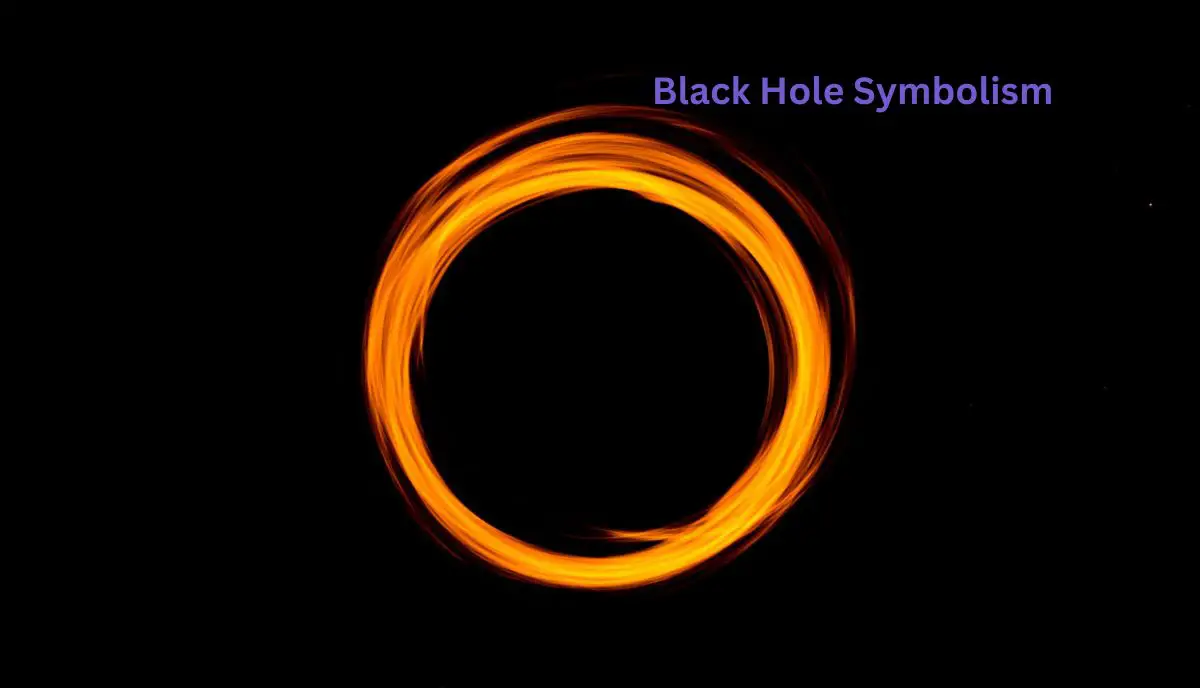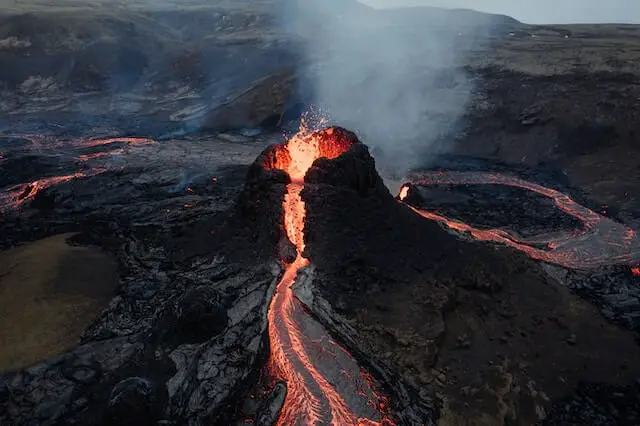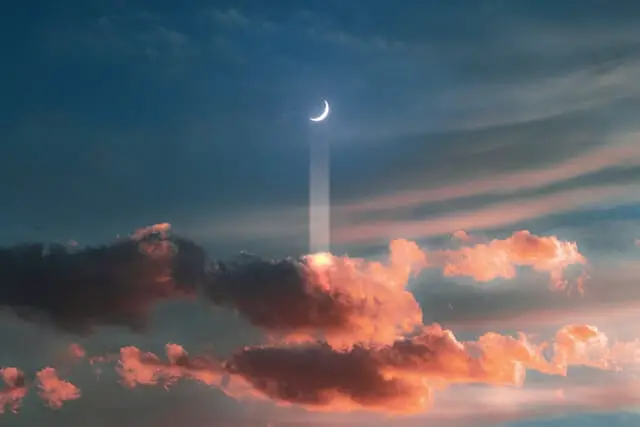In the deep, dark corners of the cosmos, where even light dares not to trespass, exist the enigmatic entities known as black holes. Fierce and yet silent, they mystify us, captivate our imagination, and reflect an intriguing facet of the universe that often goes unnoticed.
Welcome to the exploration of black hole symbolism, where we’ll together unravel these cosmic enigmas not just as astrophysical phenomena but as potent metaphors that bridge the gap between the tangible and the abstract, the scientific and the philosophical.

Black Hole Symbolism
Black holes hold deep symbolism. They represent the unknown, reflecting life’s unresolved mysteries. As cosmic absorbers, they symbolize transformation, embodying life’s continuous evolution. Their destructive nature signifies life’s disruption, mirroring unexpected upheavals. Black holes also symbolize infinity and eternity, testing our ideas of time and space, and representing isolation and loneliness, echoing solitary moments.
The Unknown

Pondering the unknown is like peering into a black hole—mysterious, intimidating, yet undeniably enticing. Black holes, the voracious cosmic phenomena, have come to embody these uncharted territories of our vast universe.
They are cloaked in mystery, and their unfathomable depths are representative of knowledge just beyond our grasp. We know they’re there, we know they’re powerful, but the intricacies of their existence continue to elude us.
Draw a parallel with the human mind—an enigmatic entity that we carry within ourselves. We laugh, we cry, we feel a range of emotions, yet the underlying mechanics of these experiences remain veiled. Our minds, much like black holes, stand as largely unexplored territories, housing mysteries waiting to be deciphered.
In essence, black holes carry profound symbolic weight as cosmic placeholders for the unknown. They remind us that despite our advancements, there are aspects of the universe, and indeed of ourselves, that we are yet to fully comprehend.
Absorption and Transformation

Think about it: a black hole, with its intense gravitational pull, engulfs all matter that comes within its reach. But it doesn’t merely swallow and contain; it transforms. Anything that enters a black hole is not the same when it exits—if it ever does. It’s a place of intense, irreversible change.
Imagine standing on the precipice of change and allowing yourself to be swept away into a journey of profound transformation. This is the very essence of what black holes symbolize when it comes to absorption and metamorphosis.
So, when we gaze at black holes, we see more than cosmic wonders. We see a celestial metaphor for transformation—dramatic, profound, and irreversible. A symbol of the beautiful capability of change, reminding us that in the grand dance of the universe, nothing ever remains the same.
Destruction

You know those moments when life feels like it’s been turned upside down? Now, think of a force so powerful, so destructive, that it can rip stars apart, scatter galaxies, and leave nothing but darkness behind. Yeah, we’re talking about black holes.
Now, don’t worry, I’m not saying that your life is as dramatic as a cosmic catastrophe (at least, I hope not!). But think about it for a second. Black holes can be seen as symbols of those earth-shattering changes or devastating emotions that have the potential to disrupt our lives entirely.
Have you ever felt an emotion so strong it shakes you to your core? Or maybe a life event that leaves you feeling like you’re standing in the rubble of what used to be your reality? Those moments, intense and overwhelming, echo the destructive power of black holes.
So, black holes, with their star-shattering force, serve as a powerful symbol of the destructive changes or emotions that we occasionally encounter. They’re not just celestial bodies; they’re cosmic metaphors for life’s tumultuous ride.
Infinity and Eternity

Close your eyes and envision yourself standing at the edge of forever, a place where time seems to have no limits, and the very nature of space twists beyond comprehension. That’s what black holes represent in the cosmos—infinity and eternity.
Black holes, these amazing wonders of the universe, are thought to be infinitely dense. So dense that our usual understanding of physics just throws up its hands and says, “I’m out!” It’s a place where the rules are not just broken; they’re rewritten. And isn’t that a fascinating thought?
This makes black holes a cosmic representation of eternity and infinity. Picturing a black hole, you can almost see the endless loops of time and space, where beginnings and ends blur into one. It’s like the universe’s way of doodling infinity symbols!
In our lives, we encounter moments that make us reflect on the concepts of eternity and infinity—those quiet, starlit nights when we think about the grandness of the universe, or moments of deep contemplation when time seems to stretch and warp.
Black holes are incredibly heavy and defy common sense. But they help us remember how huge the universe is, and how our adventure in it is never-ending. Quite a ponderous thought, isn’t it?
Creation

Life, much like the cosmos, has a strange yet fascinating rhythm. Ever noticed how after a storm, the earth seems reborn, teeming with fresh energy? Black holes exhibit a similar pattern, turning our understanding of creation on its head.
Theory has it that black holes could be cradles of newborn universes. Sounds wild, doesn’t it? But hang on.
Picture a black hole, ceaselessly devouring cosmic matter, an eternal connoisseur of celestial buffet. Now, imagine it reaches a threshold, a tipping point, where all that it has consumed could give birth to an entirely new universe.
There’s something beautiful in that idea, don’t you think? It’s like the universe itself is whispering to us about the cyclical nature of life. It’s the cosmic way of saying that endings can be beginnings, that out of the jaws of destruction can spring forth a burst of creation.
Black holes tell us that even in the face of utter destruction, there’s always a chance for something new, something beautiful to sprout. It’s the universe’s poetic tale of the cycle of life—endless, eternal, and ever-renewing.
Isolation and Loneliness

Black holes, with their solitary existence in the vast cosmic landscape, hold a certain poignancy. They pull everything in, yet nothing escapes.
Time and space bend and twist around them, creating a realm where the usual rules just don’t apply. They stand alone in their might and mystery, a beacon of solitude in the universe’s expanse.
Now, doesn’t that resonate with moments of loneliness or isolation we’ve all experienced? Those times when we feel as if we’re distorting the space around us, creating an impenetrable bubble of solitude. Black holes symbolize this very sense of solitude, making them cosmic metaphors for loneliness and isolation.
In a sense, they reflect parts of our own human experiences, the profound, the joyous, the destructive, and even the isolating. They are more than astronomical bodies; they are, in many ways, mirrors of our existence, reminding us that we are all stardust navigating through this cosmic journey of life.